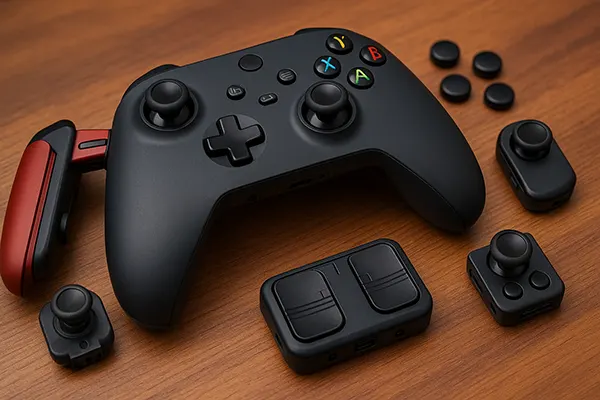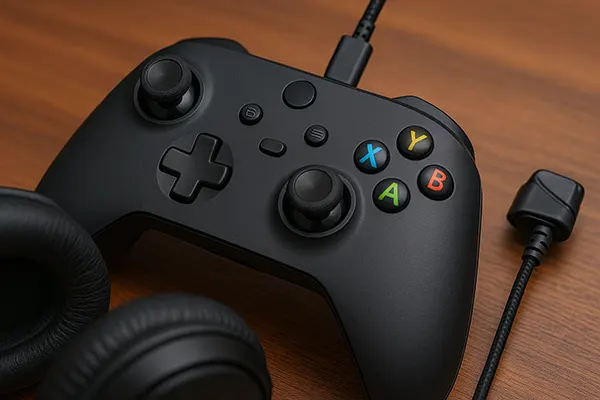
Modular Game Controllers: Trend or Not?
The gaming industry has always been driven by innovation, and in recent years, modular controllers have gained attention as a possible new direction. These devices allow players to customise their gameplay experience by swapping parts, adding attachments, and adjusting layouts to match different styles and genres. While traditional controllers remain dominant, the growing demand for flexibility raises the question: are modular game controllers just a niche product or a genuine future trend?
What Defines Modular Controllers?
Modular controllers are designed with detachable or replaceable parts, giving gamers the freedom to adapt the hardware to their preferences. This may include swappable analogue sticks, customisable triggers, and additional paddles that can be added or removed as needed. Some designs even integrate magnetic systems for quick changes without tools.
Examples such as the Logitech G Adaptive Controller and various prototype models from emerging brands highlight the push towards inclusive and flexible gaming. These devices appeal not only to competitive players but also to those with accessibility needs, showing how modularity can make gaming more approachable.
Another defining factor is the ability to create “application-specific” modes, where players can configure layouts for different game types, from racing simulators to first-person shooters. This adaptability transforms one controller into many, reducing the need for multiple devices.
Examples of Current Solutions
The Logitech G Adaptive Controller stands out as a flagship product, offering wide compatibility with external switches and modules, designed primarily for accessibility. It demonstrates how modularity can improve inclusivity in gaming without sacrificing performance.
Other brands, such as SCUF and Razer, have introduced semi-modular solutions with customisable buttons and paddles, catering more to esports and competitive gaming. These products balance between full modularity and premium performance design.
Meanwhile, smaller start-ups are experimenting with prototype designs, including hot-swappable components and software-driven remapping systems. This diversity of approaches suggests that modularity is not limited to accessibility, but is also evolving into a mainstream gaming trend.
Who Benefits from Modular Controllers?
Competitive gamers often seek small advantages that can influence match outcomes, and modular controllers give them the ability to fine-tune ergonomics and inputs. Adjusting trigger sensitivity or repositioning paddles can provide the edge required in esports competitions.
Casual players also benefit from being able to adapt controllers for different genres without buying multiple specialised devices. For instance, racing enthusiasts may switch to a layout optimised for steering and acceleration, while adventure gamers prefer precision analogue sticks and responsive triggers.
Importantly, modular controllers bring new possibilities for players with disabilities. By adjusting layouts and integrating alternative input methods, these devices provide greater accessibility, allowing more people to enjoy games on equal terms.
Use Cases Across Genres
In first-person shooters, modular controllers allow players to adjust sensitivity, add paddles for faster reloads, or fine-tune thumbstick tension for precision aiming. These modifications can significantly impact reaction times and performance.
Racing games highlight another benefit: detachable steering modules and adaptive triggers can replicate real driving experiences more effectively than standard controllers. This adaptability bridges the gap between casual and simulation-level play.
For strategy or role-playing games, modularity enables custom layouts that simplify complex commands, offering more efficient and comfortable input. These benefits make the devices attractive to a wide spectrum of players with different expectations.

Advantages and Challenges of Modularity
The most obvious advantage is customisation. Players can adjust controllers to fit their hand size, playing style, and game genre, creating a personalised experience that standard controllers cannot provide. This flexibility can extend the life of the device by reducing wear on fixed components.
Another benefit is inclusivity. Modular controllers have opened new possibilities for players with physical limitations, making gaming more accessible. This aligns with a broader industry trend towards accessibility and user-centred design.
However, modular controllers face several challenges. Compatibility across consoles and games is not always guaranteed, and additional parts can drive up the cost. Reliability is another concern, as swappable components may wear out faster or introduce technical issues.
Future Prospects of Modular Gaming
Looking ahead, modular controllers could evolve into standardised solutions with cross-platform support. If manufacturers agree on compatibility frameworks, these devices may become widely adopted rather than remaining niche.
Artificial intelligence and software-driven mapping could further enhance modularity, automatically adjusting controller layouts based on the type of game being played. This would reduce the complexity of manual configuration while improving usability.
Ultimately, modular controllers embody both innovation and experimentation. While not yet mainstream, their potential for customisation, inclusivity, and adaptability suggests they may play a larger role in the future of gaming hardware.
Popular articles
-
 Brawl Stars: How to Rank Up Faster by Choo...
Brawl Stars: How to Rank Up Faster by Choo...Ranking up in Brawl Stars in 2026 …
-
 Home Network for Cloud and Remote Gaming i...
Home Network for Cloud and Remote Gaming i...Cloud gaming and remote play are unforgiving: …
-
 The Room: Old Sins (Android/iOS): the stro...
The Room: Old Sins (Android/iOS): the stro...The Room: Old Sins is the entry …
